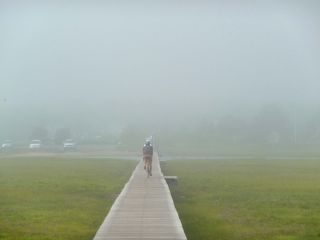December 02, 2008
Setting A Precedent

As Obama assembles his team he is also setting a precedent. It seems that he expects those who join his administration to be, and to have been honest and forthcoming. He expects as much of himself. In an interview with Cathleen Falsani, which is worth reading in it's entirety if you didn't do so already, Obama said:
One of the interesting things about being in public life is there are constantly these pressures being placed on you from different sides. To be effective, you have to be able to listen to a variety of points of view, synthesize viewpoints. You also have to know when to be just a strong advocate, and push back against certain people or views that you think aren't right or don't serve your constituents.And so, the biggest challenge, I think, is always maintaining your moral compass. Those are the conversations I'm having internally. I'm measuring my actions against that inner voice that for me at least is audible, is active, it tells me where I think I'm on track and where I think I'm off track.
He is also aware of the danger of too much moral certainty:
I think that I am disturbed by, let me put it this way: I think there is an enormous danger on the part of public figures to rationalize or justify their actions by claiming God's mandate.I think there is this tendency that I don't think is healthy for public figures to wear religion on their sleeve as a means to insulate themselves from criticism, or dialogue with people who disagree with them.
Obama, unlike some
"A standard line in my stump speech during this campaign is that my politics are informed by a belief that we're all connected. That if there's a child on the South Side of Chicago that can't read, that makes a difference in my life even if it's not my own child. If there's a senior citizen in downstate Illinois that's struggling to pay for their medicine and having to chose between medicine and the rent, that makes my life poorer even if it's not my grandparent. And if there's an Arab American family that's being rounded up by John Ashcroft without the benefit of due process, that threatens my civil liberties.
Why is it so imperative that our leader have a strong moral compass and lead with empathy and consciousness? Theoretical physicist Mark Buchanan explains the psychology of joining in in his New York Times article Chain Reactions:
.... we’ll discover that honor and dignity were sacrificed at the very top. It will be a familiar story – of a few power-hungry and largely amoral political operatives, the real drivers, whose actions encouraged and directed a small army of fairly ordinary people, the Monica Goodlings of this world, many of whom were hardly aware they were doing something wrong.People who engage in corrupt acts often do not see them as such. This much has emerged from studies of corporate scandals and fraud at places like Enron or WorldCom. In a study two years ago, for example, business professors Vikas Anand, Blake Ashforth and Mahendra Joshi concluded that most fraud within institutions takes place through the willing cooperation of many otherwise upstanding individuals with no psychological predisposition to be criminals.....
Whether embezzling money, undermining product safety regulations, or even selling completely fake products, the perpetrators rationalize away their responsibility. They deny that they actually had any choice, saying that “everyone was doing it.” Or they deny that anyone really got hurt, so there really was no crime: “They’re a big company, they can afford to overpay us.”
Then there’s the popular appeal to higher authority, a mechanism with special relevance, perhaps, to the loyalty-rewarding Bush administration: “I had to do it out of loyalty to my boss.”
But the psychology of rationalization is only part of the story. The other element in all such cases seems to be a chain-like linking together of individual actions that can undermine social norms with surprising speed – or keep them safe, sometimes if just a single person remains strong.
n the late 1970s, Stanford sociologist Mark Granovetter pointed out that the differences among people – in their willingness to engage in certain kinds of acts – can lead to surprises. Think of the dance floor at a party. Some people are more than happy to be the first out there, dancing alone, but lots of the rest of us would like some others out there first. You might be willing to go out if five or six went before you, while others might require 20 or 30. Some might not go out unless everyone at the party was out there.....This is just a toy model, but it illustrates something about the logic of people joining not only dance floors, but riots or protests, trips to the pub in the evening, getting in with others to skim cash from the restaurant till – or violating well-known rules against taking political affiliation into account when hiring. Tiny differences in the group makeup, the presence or absence or a few people of the right type, might be the difference between a few renegade violators and division-wide corruption.
In spite of Obama's win, we are still operating under corrupt leadership. We need only examine some of Bush's sterling sychophants Henry Paulson, Karl Rove, Alberto Gonzalves, Dick Cheney, Sarah Palin our mortgage lenders and the general state of the world, to observe his corrosive influence.
Waaaayyyyy too much? You're probably already sorry we took off the turkey hat.
Photo note: Lonely rider balances on a straight and narrow path into the unforseeable - a metaphorophoto
Posted by Dakota at December 2, 2008 09:08 PM